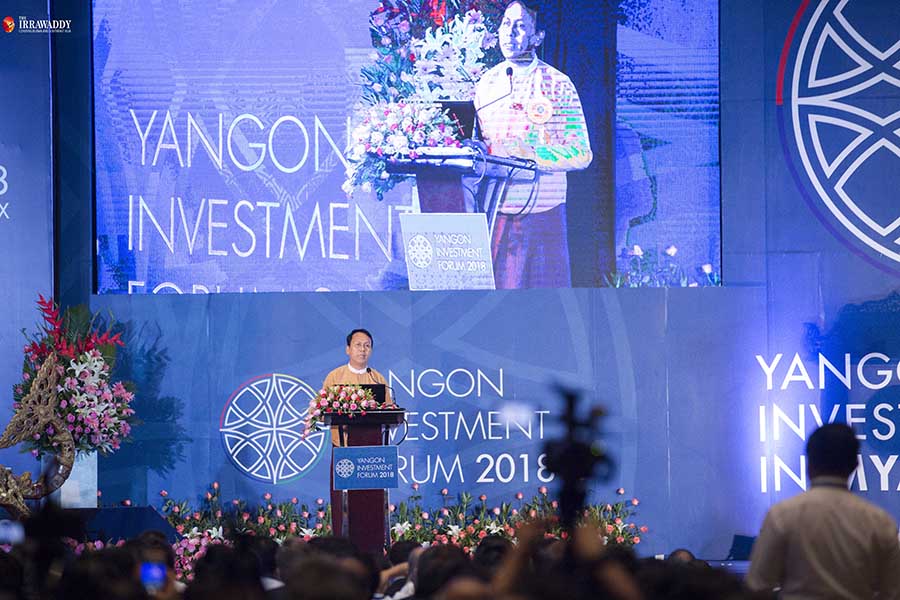YANGON — Yangon Chief Minister U Phyo Min Thein vowed to focus on economic growth in 2018 and laid out a five-point vision for the city’s development at the Yangon Investment Forum on Wednesday.
U Phyo Min Thein said boosting the city’s economy would be one of the regional government’s priorities this year, along with improving the rule of law and cleanliness — some of Yangon’s main challenges.
Organized by the Yangon Region Investment Committee (YRIC), the forum aims to boost foreign investment in Myanmar’s largest city and commercial capital.
Addressing an audience of more than 1,000 international and local investors and businesspeople, the chief minister, who also chairs the YRIC, promised to create more investment opportunities in industry, trade and logistics, transportation, energy and sustainable urban development.
A lack of clear policies, red tape, poor infrastructure, frequent power cuts and high land prices have long stood in the way of doing business in Yangon. But U Phyo Min Thein argued that those challenges were investment opportunities in themselves.
“Challenges are great opportunities for investors because they can get involved in developing those projects,” he said.
Projects in the regional government’s pipeline include a new deep-sea port and special economic zone (SEZ); the development of new industrial zones on the city’s outskirts; upgrades to the power supply, infrastructure and waste management of the city’s existing 29 industrial zones; upgrades to the city’s transport system; and city expansion.

U Phyo Min Thein said Yangon would soon see an additional 1,500 megawatts of electricity supply thanks to new power plant in the works in Irrawaddy and Tenasserim regions.
Throughout the forum, he also emphasized that the government was working on cutting red tape.
The chief minister said the new port was needed because the current port in downtown Yangon, which handles 90 percent of the entire country’s import and export traffic, could not be expanded to handle the growing demands of modern logistics. He said 50,000 acres of land in the south of the city have been set aside for the new port and SEZ and that the government would start accepting bids soon.
The chief minister said all the projects offered investors good opportunities and that the regional government has been in discussions with investors across ASEAN on various plans.
Wedged in between India and China, together home to some 40 percent of the world’s population, Myanmar — and Yangon especially — was well placed to become a regional trade and transportation hub, U Phyo Min Thein said.
“We will try to develop Yangon as an investment hub not only in Myanmar but also in the region,” he said.
U Khin Maung Aye, chairman of the Myanmar Investors Development Association, the forum’s main sponsor, told reporters that investors at the event expressed interest in the new SEZ and other infrastructure and agriculture projects. But he cautioned that it remained to be seen whether those investors would actually follow through.
Khin Marlar Maung Maung, a director of Da Na Aung Si Construction Co. Ltd., told The Irrawaddy that her company was interested in the government’s expansion and energy projects.
“The chief minister highlighted that the government will prioritize green energy projects. We are very interested in that, as well as in the construction of a plant to convert waste into energy, which could help the city’s waste management a lot,” she said.

















